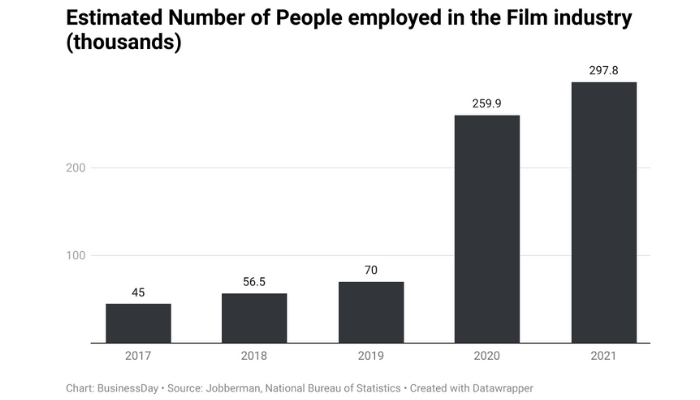We know about Hollywood and Bollywood— Nollywood is from Nigeria.
Nollywood, a term that might sound odd to some, is actually a significant and vibrant part of the global film industry. Originating in Nigeria, it represents the entirety of the Nigerian movie sector and stands as the second-largest film industry in the world in terms of movie output. This blog post delves into the essence of Nollywood, exploring its origins, impact, and unique characteristics from a Constructivist perspective in International Relations Theory.
Nollywood’s Recent Success
“A Tribe Called Judah,” a Nollywood film directed by Funke Akindele, has set a new box office record in Nigeria by earning 1 billion naira in just three weeks. This milestone surpasses the earnings of Hollywood blockbusters like “Black Panther: Wakanda Forever” in Nigerian theaters. The film, which narrates a story about a mall robbery by five brothers, reflects Akindele’s dedication to storytelling and cultural representation. It has received widespread acclaim, showcasing the growing influence and global competitiveness of the Nollywood industry.

The Birth of Nollywood
Nollywood’s journey began in the early 1990s with the release of the film “Living in Bondage.” This movie, shot on a modest budget, was a huge success and laid the foundation for what would become a booming industry. It marked a shift from the traditional Nigerian theater, bringing storytelling into the homes of millions.
Nigerian movies are known for their dramatic, often melodramatic, storylines, which frequently touch on themes like love, betrayal, and ambition. The industry is also characterized by its swift production timelines and cost-effective budgeting, making movie-making accessible to a wider range of filmmakers.
Hollywood vs Nollywood vs Bollywood
| Indicator | Hollywood | Bollywood | Nollywood |
|---|---|---|---|
| Origin | United States | India | Nigeria |
| Establishment | Early 20th Century | 1930s | Early 1990s |
| Output (Films per year) | Around 700-800 | Over 1000 | Over 2000 |
| Global Influence | High, with worldwide distribution | Moderate, with large diaspora audience | Growing, mainly in Africa and among African diaspora |
| Popular Genres | Diverse, including action, drama, sci-fi | Romance, drama, action, musicals | Drama, comedy, romance |
| Distribution | Global theatrical releases, streaming platforms | Theatrical releases in India, diaspora regions, streaming platforms | Primarily local markets, some international streaming |
| Key Characteristics | High production value, star system | Musical sequences, melodrama, star power | Low budget, quick production, direct-to-video releases |
| Language | Primarily English | Primarily Hindi, regional languages | Primarily English, local languages |
| Cultural Impact | Significant, with global cultural influence | Significant in India and among Indian diaspora, contributing to global recognition of India. | Significant in Nigeria and West Africa |
Nigeria’s Cultural Representation
Nollywood provides a lens into the diverse cultures, languages, and traditions of Nigeria. The industry serves as a platform for showcasing African stories through an African perspective, a feature that makes it profoundly relatable to its African audience.
Constructivist Analysis of the ‘ollywood’s
As an internationalist in training, I find the rise of Nollywood, alongside its counterparts like Bollywood and Hollywood, even more fascinating when viewed through the Constructivist lens. Constructivism, a theory in international relations, emphasizes the role of ideas, norms, and culture in shaping the international system. This perspective offers a unique understanding of the global influence of film industries, so let’s break down the most important aspects that construct this niche of the global society.
1. Cultural Norms and National Identity: Nollywood, much like Bollywood and Hollywood, constructs and spreads the cultural norms and national identity of Nigeria. Where Hollywood often promotes Western ideals and the ‘American Dream,’ Bollywood celebrates Indian culture, traditions, and values. Nollywood, on its part, has become a medium through which African stories, often overlooked by mainstream media, gain a voice and recognition. This storytelling is not just entertainment; it’s a form of cultural diplomacy, shaping perceptions and norms both nationally and internationally.
2. Soft Power and International Influence: From a constructivist viewpoint, the film industry is a powerful tool for soft power. Nollywood’s growth reflects Nigeria’s increasing soft power which enables it to influence others through cultural appeal rather than coercion. As Nollywood movies gain popularity, they have the potential to shift global narratives about Africa, challenging stereotypes and offering more detailed portrayals of African life.
3. Globalization: The expansion of these film industries is a testament to the effects of globalization, facilitating cultural exchange and understanding. Nollywood, for instance, while deeply rooted in Nigerian culture, is increasingly influenced by global trends, and in turn influences viewers and filmmakers beyond Africa. This two-way cultural flow shows constructivism’s emphasis on the mutual shaping of international actors and structures.
Constructivist theory suggests that national and international norms are socially constructed. Film industries contribute to this by portraying societal transformations, gender roles, and moral dilemmas, often influencing public opinion and policy. Nollywood’s portrayal of issues like corruption, poverty, and gender roles has a part in shaping societal norms and expectations in Nigeria and across Africa.
Economic Impact & Future Challenges for Nollywood
Nollywood is a significant contributor to the Nigerian economy, providing employment to thousands and offering a form of soft power for Nigeria on the global stage. Its movies are not just popular in Africa but have also gained an audience internationally.

Nollywood is growing at an astounding rate, it employed almost 300,000 people in 2021, and it has leapt from being a multi-million dollar industry in 2020, to being a multi-billion dollar Nigerian industry in 2023.
Despite its success, Nollywood faces challenges such as piracy and limited funding in comparison to the Hollywood giant. However, with the rise of digital media and platforms like Netflix, Nollywood is evolving, gaining better production quality, and reaching a broader international audience.
Conclusion on the Nigerian Hollywood
Nollywood is not just another entertainment industry; it’s a cultural phenomenon that reflects the spirit and resilience of Nigeria and Africa as a whole. As it continues to evolve and adapt, Nollywood is set to leave an even more significant mark on the world cinema stage.
#Nollywood #AfricanCinema #NigerianMovies #FilmIndustry #CulturalCinema
References
- Aradi, B. G. (2024, 5 enero). A tribe called Judah becomes highest-earning Nigerian film. BBC News. https://www.bbc.com/news/world-africa-67889661
- Team, N. (2023, 28 febrero). Nollywood – Everything you need to know. NFI. https://www.nfi.edu/nollywood/#:~:text=The%20Nigerian%20film%20industry%2C%20known,surpassed%20by%20Bollywood%20in%20India.
- Fast-growing Nollywood creates the most jobs in 5yrs. (2022, 10 enero). Business Day. https://businessday.ng/big-read/article/fast-growing-nollywood-creates-the-most-jobs-in-5yrs/
- ChatGPT. (n.d.). OpenAI. https://chat.openai.com/#
- Facts About Nigeria. (2020, 9 agosto). Nigerian Movies | History of the Nigerian movie industry. https://total-facts-about-nigeria.com/nigerian-movies.html
- Johnson-Omodiagbe, C. (2023, 22 junio). Nollywood Next Gen: Meet the Actors set to take over 2023. Zikoko! https://www.zikoko.com/pop/nollywood-next-gen-meet-the-actors-set-to-take-over-2023/









2 Responses
Me agrada la idea de conocer más sobre otras culturas en desarrollo cinematográfico y me sorprende que lleguen a niveles de comparación con Hollywood
A mi tambien! Yo no sabía de Nollywood antes de la noticia de CNN pero ahora veo que es muy posible que llegará al fama que logró Bollywood.